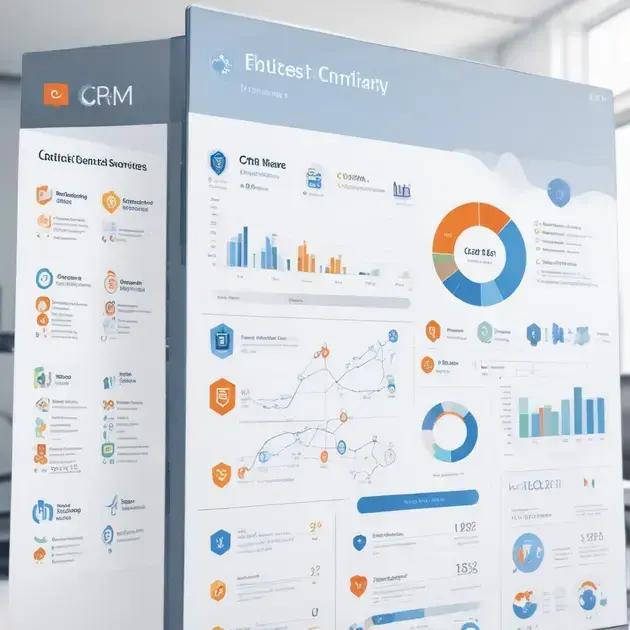CRM costs vary based on factors such as type, number of users, and features. Investing in a CRM system enhances customer relationships, streamlines processes, and can lead to significant improvements in business efficiency and sales performance.
CRM cost is an essential consideration for businesses looking to streamline operations and improve customer relationships. By understanding how these costs can vary, organizations can make informed decisions that align with their strategic goals. In this article, we’ll delve into what contributes to CRM costs, explore the factors that influence them, and discuss how investing in the right CRM solution can ultimately save you money and enhance your business operations.
What is CRM Cost?
CRM cost refers to the financial investment required by a business to implement and maintain a Customer Relationship Management system. This cost includes several components that can vary greatly depending on the size of the business, the capabilities of the CRM platform, and the required support services.
Types of CRM Costs
The primary types of CRM costs include:
- License Fees: These are the fees charged for using the CRM software, and they can be based on per user or a flat rate. Some providers also offer tiered pricing based on the features chosen.
- Implementation Costs: Businesses may need to invest in data migration, system integration, and configuration to tailor the CRM to their needs. This phase often involves consultation fees and internal resource allocation.
- Training Expenses: Proper training is crucial for successful CRM adoption. Costs may arise from workshops, online courses, and time spent by employees learning the new system.
- Ongoing Maintenance: This includes software updates, technical support, and any additional features or upgrades that may be required as business needs change.
Understanding the Total Cost of Ownership
The total cost of ownership (TCO) of a CRM system goes beyond initial expenses. Businesses must also consider ongoing costs and potential hidden fees which can add up over time. Understanding these costs allows companies to budget accurately and choose a CRM solution that aligns with their goals.
By grasping what CRM cost entails, businesses can make more informed decisions on the systems they choose, ensuring they derive maximum value from their investment.
Factors Influencing CRM Cost

The cost of CRM systems can vary significantly based on multiple factors. Understanding these factors is crucial for businesses looking to choose the right CRM solution that fits their budget and needs.
1. Type of CRM Software
There are several types of CRM software available in the market, including cloud-based and on-premise solutions. Cloud-based CRMs typically have lower upfront costs but may involve subscription fees. In contrast, on-premise solutions require higher initial investments for software and hardware but may have lower ongoing costs.
2. Number of Users
The number of users who require access to the CRM can greatly influence the cost. Many CRM providers charge per user, so the more users you have, the higher your overall expense will be. Consider your team’s size and their roles when evaluating CRM costs.
3. Customization and Scalability
Some businesses may need a highly customized CRM to meet specific operational needs. Customization can significantly increase costs. It’s essential to consider future growth as well; a scalable CRM may involve additional fees as your organization expands.
4. Features and Integrations
Different CRM systems come with various features, such as sales tracking, marketing automation, and customer support tools. More advanced features will generally increase the cost. Additionally, integrating the CRM with other systems (like accounting software or eCommerce platforms) can incur further expenses.
5. Support and Training Services
Ongoing support and training are necessary for the effective use of any CRM system. Depending on the vendor, these services may be included in the subscription or offered at an extra charge. Training costs can also add up if multiple team members need to be trained.
By carefully evaluating these factors, businesses can better anticipate their CRM costs and select the most appropriate solution for their needs.
Typical CRM Cost Ranges
Understanding the typical CRM costs is essential for businesses planning to invest in a system that suits their needs. Prices can vary widely based on the type of CRM, number of users, and features required.
1. Cloud-Based CRM Solutions
Cloud-based CRM systems typically charge on a subscription basis. Monthly fees can range from $12 to $300 per user, depending on the complexity of the software and the functionalities included. More basic options with essential features can start around $12 to $25 per user, while advanced CRMs with automation tools and analytics can go up to $300 or more per user.
2. On-Premise CRM Solutions
On-premise CRMs usually require higher upfront costs because businesses must purchase licenses and possibly invest in hardware. Initial costs can vary from $1,000 to $5,000 per user, depending on the software’s capabilities. Additionally, you must factor in ongoing maintenance and possible upgrade fees.
3. Tiered Pricing Models
Many CRM providers offer tiered pricing models based on the features available at each level. Entry-level plans may cost around $12 to $25 per user per month, while intermediate tiers with more robust functionalities might range from $50 to $150 per user per month. Premium plans with all features could exceed $200 per user per month.
4. Additional Costs to Consider
In addition to subscription fees, consider other potential costs such as implementation fees, training expenses, and integration costs with other platforms. These costs can add an additional 10% to 30% to your initial CRM budget. For example, companies often spend an average of $1,200 to $3,000 on setup and training.
Given this wide range of options, businesses should assess their requirements, budget, and desired features to find a CRM solution that provides value without overspending.
Benefits of Investing in CRM Systems

Investing in a CRM system offers numerous advantages for businesses of all sizes. These benefits can enhance operations, improve customer relationships, and ultimately lead to higher revenue.
1. Improved Customer Relationships
A CRM system centralizes customer information, enabling businesses to understand and anticipate customer needs better. This leads to more personalized interactions and improved customer satisfaction, fostering loyalty.
2. Enhanced Data Management
With a CRM, businesses can store and manage vast amounts of customer data more effectively. This organized data helps in tracking customer interactions, preferences, and purchase history, which can be useful for targeted marketing efforts.
3. Streamlined Business Processes
CRM systems automate repetitive tasks like data entry, follow-ups, and reporting. This automation frees up employee time, allowing staff to focus on strategic tasks that can drive business growth.
4. Better Sales Management
CRM tools provide valuable insights and analytics that can guide sales strategies. Features like sales forecasting and pipeline management help sales teams identify opportunities and track performance more accurately.
5. Increased Collaboration
Many CRM systems allow for easier collaboration among team members. Different departments can access customer information in real-time, ensuring everyone is on the same page and enhancing teamwork.
6. Scalability
As businesses grow, a CRM system can scale with them. This flexibility means that companies can adapt their CRM to fit changing needs without starting from scratch.
In summary, investing in a CRM system can significantly improve a business’s efficiency and effectiveness. By enhancing customer relationships and streamlining operations, businesses can achieve greater success.
Reducing Your CRM Cost
Creating a budget-friendly strategy for your CRM costs is essential for maximizing value. Here are several strategies for reducing your CRM expenses.
1. Choose the Right Pricing Model
Select a CRM solution that fits your business size and budget. Cloud-based solutions often offer flexible pricing models, such as pay-per-user or tiered plans, that can help control costs. Assess your actual needs before committing to a plan.
2. Limit the Number of Users
Review how many users truly need access to the CRM system. Reducing the number of licenses can significantly lower monthly fees. Make sure only essential team members have access to maximize investment.
3. Utilize Built-in Features
Many CRM systems come with a variety of built-in features. By fully utilizing these features instead of paying for third-party add-ons, you can manage costs effectively. Understand all the tools available and integrate them into your workflow.
4. Optimize Training Costs
Instead of investing heavily in external training sessions, consider having knowledgeable in-house team members conduct training for new users. This can reduce costs while ensuring employees receive the information they need to use the CRM effectively.
5. Look for Discounts and Promotions
Many CRM providers offer discounts for annual payments or promotional pricing for new customers. Taking advantage of these offers can lead to considerable savings. Be sure to check regularly for any opportunities to lower your costs.
6. Evaluate Vendor Support Options
Choosing a CRM that has efficient customer support can save you time and money in the long run. Look for vendors that offer comprehensive support at no extra charge. A reliable support team can help reduce downtime and resolve issues quickly.
By implementing these strategies, businesses can effectively minimize their CRM costs, ensuring they gain maximum benefit from their investment while staying within budget.
Wrapping Up the Importance of CRM Investment
Investing in a Customer Relationship Management (CRM) system is a crucial step for any business looking to improve customer interactions and streamline processes. With the right CRM in place, businesses can enhance customer satisfaction, boost sales, and foster team collaboration.
Additionally, understanding the various factors that influence CRM costs can help businesses make informed decisions when choosing a solution. By adopting smart strategies to reduce these costs, companies can maximize their investments and ensure that they are getting the best value possible.
Embracing CRM technology can transform how you connect with customers, making it easier to manage relationships and drive growth. Don’t miss the opportunity to leverage CRM systems to take your business to the next level.
FAQ – Frequently Asked Questions about CRM Costs and Benefits
What is a CRM system?
A CRM (Customer Relationship Management) system is a software that helps businesses manage interactions with current and potential customers, enhancing relationships and streamlining processes.
How can a CRM system improve customer relationships?
A CRM system centralizes customer data, allowing businesses to tailor interactions, track customer behavior, and respond quickly to needs, which improves overall satisfaction.
What factors influence the cost of a CRM system?
Factors include the type of CRM (cloud-based or on-premise), number of users, features required, customization, and ongoing support services.
How can I reduce my CRM expenses?
You can reduce CRM costs by choosing the right pricing model, limiting user licenses, utilizing built-in features, optimizing training methods, and looking out for discounts.
Are there any benefits to investing in a CRM system?
Yes, benefits include improved customer relationships, enhanced data management, streamlined business processes, better sales management, and increased collaboration among team members.
How important is ongoing support for a CRM system?
Ongoing support is crucial as it ensures your team can effectively use the system and resolve any issues quickly, minimizing downtime and maximizing productivity.




